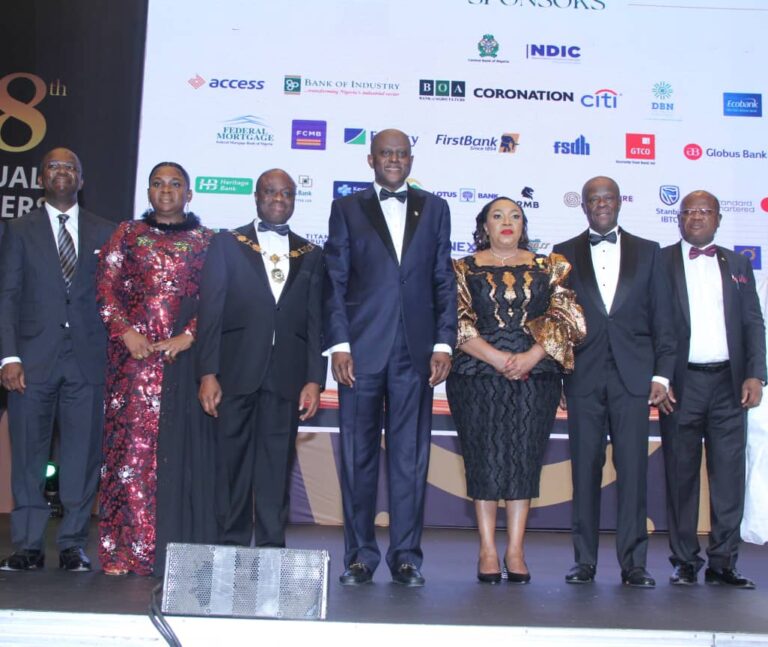Photo caption: From left Chairman, Senate Committee on Banking, Insurance and Other Financial Institutions, Senator Tokunbo Abiru; Wife of the CIBN President, Ngozi Opara; President/Chairman of Council of the Chartered Institute of Bankers of Nigeria (CIBN), Dr. Ken Opara; Governor of the CBN, Olayemi Cardoso; National Treasurer of the institute, Mrs. Mojisola Bakare-Asieru; Minister of Finance and Coordinating Minister for the Economy, Wale Edun; and First Vice President, CIBN, Prof. Pius Deji Olanrewaju at the 58th Annual Bankers Dinner and 60th Anniversary of CIBN in Lagos, Friday, November 24, 2023.
Olayemi Cardoso, Governor of the Central Bank of Nigeria (CBN), at the weekend in Lagos lamented that the institution over the years abandoned its core mandates of ensuring price stability, issuing legal tender currency, safeguarding external reserves, promoting a sound financial system, and providing economic and financial advice to the government, straying into the fiscal space by engaging in development finance activities.
Cardoso, who was speaking at the 58th Annual Bankers’ Dinner and Grand Finale of the 60th Anniversary of the Chartered Institute of Bankers of Nigeria (CIBN), his first, regretted how in the process the CBN pumped over N10tr in the economy in different initiatives in sectors ranging from agriculture, aviation, power, youth and many others.
These activities which have also put the CBN in bad light, he said “can be attributed to various factors, such as corporate governance failures, diminished institutional autonomy of the Central Bank of Nigeria, a deviation from the core mandate of the Bank, unorthodox use of monetary tools, an inefficient and opaque foreign exchange market that hindered clear access, a foray into fiscal activities under the cover of development finance activities. There was also a lack of clarity in the relationship between fiscal and monetary policies, among other challenges.”
Continuing, Cardoso said they clearly distracted the apex bank from achieving its own objectives having engaged in “areas where it clearly had limited expertise.”
Going forward, the new CBN Governor who resumed office in September, assured that “as an adviser to the government, the CBN will be repositioned as a catalyst for economic stability and growth.
As part of its strategic refocusing on our core mandate, he said “the CBN will discontinue direct quasi-fiscal interventionist activities and instead utilize orthodox monetary policy tools for implementing monetary policy.
Rather than “direct interventions, we will collaborate with stakeholders and formulate policies that create an enabling environment for sustained economic growth and development. Our catalytic role will support increased investment and private sector participation in the economy, improve access to finance for MSMEs, and enhance financial services for the underbanked.
“This includes promoting specialized institutions and financial products to support emerging sectors, developing regulatory frameworks to unlock dormant capital in land and property holdings, facilitating accelerated access to consumer credit, and expanding financial inclusion to reach the masses.
“Furthermore, we will work with experts to develop de-risking instruments that encourage private sector investment in key industry verticals such as housing, textiles and clothing, food supply chain, healthcare, and educational supplies, which have high potential for local inputs and value retention. The CBN will leverage its convening power to engage multilateral and international stakeholders in government and private sector initiatives,” the CBN Governor stressed.
Continuing, he said “as part of this refocus, the CBN has just approved the adoption of an explicit inflation-targeting framework to enhance the effectiveness of our monetary policy. The details and requirements for this framework are currently being finalized alongside the fiscal authorities. Additionally, the CBN will provide forward guidance, enhance transparency, and maintain effective communication with the public to anchor expectations and build trust among stakeholders.”
For him, there is much work to be done, and collaboration from all stakeholders is essential as we rebuild trust, he told the gathering which also included the Vice President Kashim Shettima and Finance Minister, Olawale Edun, stressing the need for the bank to rebuild and restore trust as a bank of last resort to government, while enhancing the the financial system to which he is irrevocably committed.
While navigating these challenging economic times, he stressed that the CBN is “fully committed to ensuring price stability and financial system sustainability.
“We will stand by Nigeria and Nigerians. Our actions will be fully guided by the principles of transparency, responsibility, and a deep commitment to Nigeria’s progress,” Cardoso added.
As part of the reforms, he said the CBN under his leadership, “will vigorously address these issues. We will tackle institutional deficiencies, restore corporate governance, strengthen regulations, and implement prudent policies. We assure investors and the business community that the economy will experience significant stability in the short-to-medium term as we recalibrate our policy toolkits and implement far-reaching measures.”
Monetary policies, going forward, he said, “will aim to achieve price stability, foster sustainable economic growth, stabilize the exchange rate of the naira, and reduce interest rates to facilitate borrowing and investments in the real sector. In order to ensure the proper functioning of domestic and foreign currency markets, clear, transparent, and harmonized rules governing market operations are essential.
“New foreign exchange guidelines and legislation will be developed, and extensive consultations will be conducted with banks and FX market operators before implementing any new requirements,” Cardoso added.
He said the FX market has responded positively to tranche payments made to enable 31 banks clear the backlog of forward obligations thereby improving liquidity, even as such have been subjected to detailed verification, ensuring that only valid transactions are honored.
“In a properly functioning market, it is reasonable to expect significant FX liquidity, with daily trade potentially exceeding $1bn. We envision that, with discipline and focused commitment, foreign exchange reserves can be rebuilt to comparable levels with similar economies,” he stressed further.








